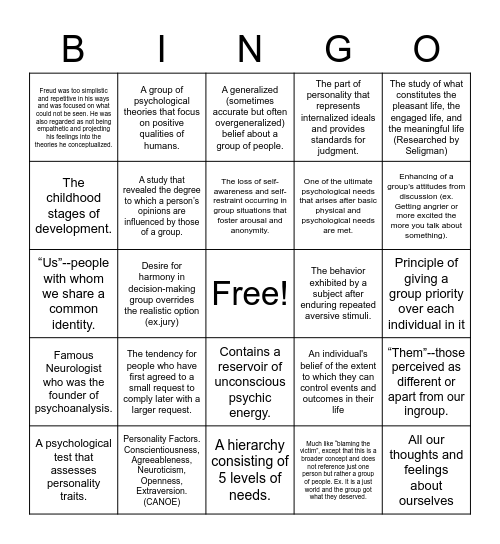

This bingo card has a free space and 54 words: Freud’s theory of personality that attributes thoughts and actions to unconscious motives and conflicts., Famous Neurologist who was the founder of psychoanalysis., A reservoir of mostly unacceptable thoughts, wishes, feelings and memories., Position before consciousness (not currently aware of but could be brought into consciousness at any given moment)., Contains a reservoir of unconscious psychic energy., The largely conscious, “executive” part of personality., The part of personality that represents internalized ideals and provides standards for judgment., The ego’s protective methods of reducing anxiety., The childhood stages of development., A personality test, such as the Rorschach or TAT., Freud was too simplistic and repetitive in his ways and was focused on what could not be seen. He was also regarded as not being empathetic and projecting his feelings into the theories he conceptualized., A characteristic pattern of behavior., Personality Factors. Conscientiousness, Agreeableness, Neuroticism, Openness, Extraversion. (CANOE), A psychological test that assesses personality traits., Reters to the controversy concerning whether the person or the situation is more influential in determining a person's behavior, A hierarchy consisting of 5 levels of needs., All our thoughts and feelings about ourselves, One of the ultimate psychological needs that arises after basic physical and psychological needs are met., A social and political ideology that places a high value on the individual., Principle of giving a group priority over each individual in it, An individual's belief of the extent to which they can control events and outcomes in their life, The theory set forth by psychologist Albert Bandura which states that a person's behavior both influences and is influenced by personal factors and the social environment., The behavior exhibited by a subject after enduring repeated aversive stimuli., The study of what constitutes the pleasant life, the engaged life, and the meaningful life (Researched by Seligman), Way in which people process, remember, and use information in social contexts to explain/predict their own/others behavior., A group of psychological theories that focus on positive qualities of humans., The tendency for observers, when analyzing another’s behavior, to underestimate the impact of the situation and to overestimate the impact of personal disposition., Feelings, often influenced by our beliefs, that predispose us to respond in a particular way to objects, people, and events., Mental processes that we use to form impressions of other people, Much like “blaming the victim”, except that this is a broader concept and does not reference just one person but rather a group of people. Ex. It is a just world and the group got what they deserved., Claim success is from our own efforts and our failures aren’t our faults but due to outside forces beyond our control., Tendency to attribute one’s own behavior to outside influences and give yourself the pass., The theory that we act to reduce the discomfort we feel when two of our thoughts are inconsistent. For example, when our awareness of our attitudes and of our actions clash, we can reduce the results dissonance by changing our attitudes., Preconceived judgment, opinion or attitude directed toward certain people based on their membership in a particular group., A generalized (sometimes accurate but often overgeneralized) belief about a group of people., Unjustifiable negative behavior toward a group and its members., “Us”--people with whom we share a common identity., “Them”--those perceived as different or apart from our ingroup., A study that looks at what causes groups to change their behavior when they come into contact with each other., A study that revealed the degree to which a person’s opinions are influenced by those of a group., A study that explored the willingness of individuals to follow the orders of authorities when those orders conflict with the individual’s moral judgment (obedience)., A study that focussed on the diffusion of responsibility (Bystander effect)., Less likely to give help when there are more people around because everyone thinks someone else will help., When a person is less likely to take responsibility for action when other bystanders or witnesses are present., The tendency for people who have first agreed to a small request to comply later with a larger request., Influence resulting from a person’s desire to gain approval or avoid disapproval., Influence resulting from one’s willingness to accept others’ opinions about reality., The tendency for people in a group to exert less effort when pooling their efforts toward attaining a common goal than when individually accountable., The loss of self-awareness and self-restraint occurring in group situations that foster arousal and anonymity., Desire for harmony in decision-making group overrides the realistic option (ex.jury), Enhancing of a group’s attitudes from discussion (ex. Getting angrier or more excited the more you talk about something)., The phenomenon that repeated exposure to novel stimuli increases liking of them., Unselfish regard for the welfare of others. and The theory that our social behavior is an exchange process, the aim of which is to maximize benefits and minimize costs..
Social Psychology Bingo | Social Psychology | Social Psychology | Attitudes and Behaviors | T4C
Share this URL with your players:
For more control of your online game, create a clone of this card first.
Learn how to conduct a bingo game.
With players vying for a you'll have to call about __ items before someone wins. There's a __% chance that a lucky player would win after calling __ items.
Tip: If you want your game to last longer (on average), add more unique words/images to it.